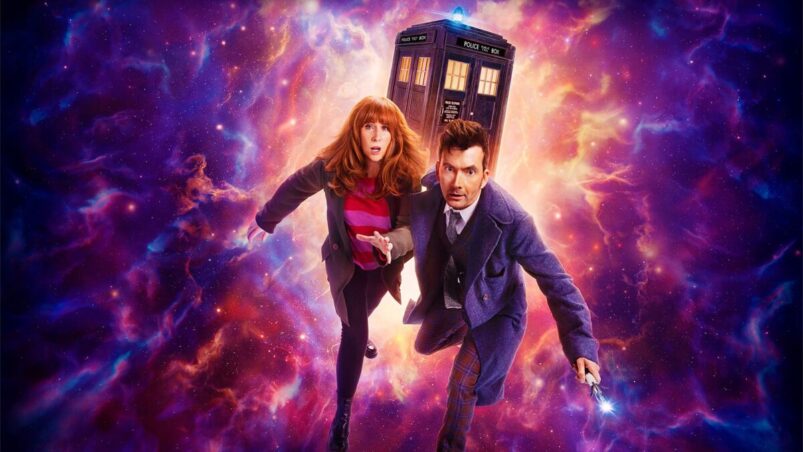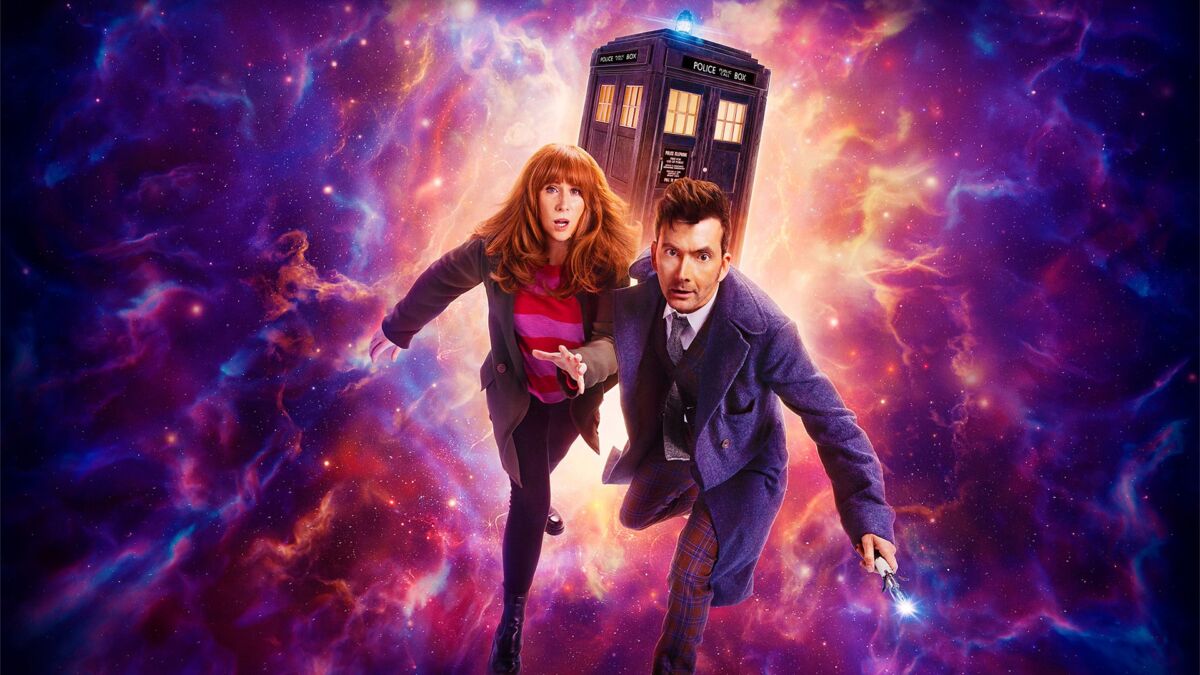It’s become the tradition, every ten years since it first started, for Doctor Who to celebrate its anniversary by bringing back the previous iterations of the show’s central character, allowing it to celebrate the past in a way few other shows can. Although this has often tended to produce episodes that are more concerned with fan service than actual plot, it’s always a fun moment, for those who are fans, or who have grown up with the show, to see past versions of the character popping up briefly to mesh with whomever the current one is – even if those previous actors look far older than you remember.
For this anniversary however, the three specials released to mark the 60th have done something a bit different. Rather than going with the usual format of just having the previous actors show up for a bit then head off again, they’ve instead brought back former star David Tennant as the current incarnation of the character once more, after a regeneration that ends in him getting his old face back. And just like that, it’s like it’s 2008 all over again. Just don’t look at your phone, turn off your brain for a bit, and we can all just go back to being innocent, carefree ten year olds again. That’s how it works, right? Wait, what do you mean, ‘no’?
With Catherine Tate also returning as companion Donna and previous showrunner Russell T. Davies back on writing duties, as well as a score by former composer Murray Gold, the three specials appear very much focused on a return to that specific era, when the show was at the height of its popularity, with some of the most consistent writing it’s ever had, numerous spin offs, and was regularly pulling in an average of 7 million viewers a week. It’s a move that does feel very much like it’s geared as an attempt towards recapturing former glories, and attracting old fans, after what has been an increasingly troubled period for the franchise in recent years.
The previous anniversary special, which aired over the show’s 50th, across cinemas as well as on television, was, arguably, the last point when the show was truly seen as Event TV, being watched by practically everyone. The show has continued to have a loyal fan base since then but, nevertheless, has increasingly lost many of the viewers and the recognition that it had enjoyed prior, as it’s suffered from weaker writing, inconsistent scheduling, and a rapidly changing TV landscape.
By the end of previous Doctor Jodie Whittaker’s tenure, the show only had around 3 million viewers tuning in, the lowest numbers it had gotten since back in 1989, when the original show was cancelled. This, as well as anything else, is likely a key reason why the show has not only brought back Tennant as its star for the 60th, but is once again being managed by the same writing and production team who’d revived it in the first place.
But are the new specials able to recapture any of that old magic? For anyone who grew up with this version of the show, there’s no denying the level of nostalgia that’s conjured just from having Tennant and Tate back together on screen. The two of them slip back into their roles effortlessly, with the same easy rapport that made them such a hit in the first place.
Tennant may be noticeably older at this point, but from the get-go it’s as if he’d never left, bringing all the same energy and intensity to the role that he’d made his own before. At the same time, this new version of the character still feels noticeably distinct from what came before, with a level of humanity and vulnerability on display here that feels very different from even Tennant’s previous tenure. Meanwhile, Catherine Tate’s Donna brings all the same kind of comic timing and delivery to the role that she did before, while at the same time playing a character who feels a bit more mature, with the addition of a family in the years since her character left. Unfortunately there is little in these specials that really tests her character, at least to the extent of some of her original episodes.
For those who weren’t fans during their previous era of the show, then these specials perhaps aren’tthe most accessible entry point into the show. The first episode in particular, The Star Beast, throws viewers headfirst into both the previous storyline – continuing on from fifteen years ago, in which Donna has lost all her memories of the Doctor – and also the most unapologetically camp, over the top kind of spectacle that Russell T. Davies regularly came out with during his original run on the show.
Of these three episodes, The Star Beast feels like the most lightweight and disposable – a big, family friendly, fast-paced piece of fluff that serves to reunite the two leads, but which doesn’t have much else going on besides this. A loose adaptation of a comic strip from 1980, with monsters that are purposefully designed to reflect this source material, the plot itself is straight out of Gremlins, with a cute, alien furball known as The Meep, voiced by Miriam Margoyles, quickly being revealed to be a malicious criminal who’s been on the run and is out to cause chaos.
The meat of the episode comes from the reunion between The Doctor and Donna, along with the rest of the Noble family, as The Doctor struggles to keep Donna from recollecting their adventures together in order to save her life. Ultimately of course, she does end up remembering, and while this may have been necessary for getting the characters back together, it does end up feeling all too easy, after viewers had been told, for fifteen years running, that this couldn’t happen without catastrophic consequences.
The two specials that come after this are both a lot more interesting in terms of concept, with a bit more going on than simply getting these two characters back in a room together. Which is ironic, because the second special, The Wild Blue Yonder, is mostly these two stuck in a room together – twice over. With the two characters stranded together on a mysterious spaceship, at the end of the universe, facing off against an entity that’s taken their forms, the episode goes for a much more mysterious and horror-inspired atmosphere than the others.
It’s an interesting storyline, one which allows both actors to display sides to the characters that they’d rarely get to, being at turns menacing and vulnerable. The whole of the monologue that Tennant gets in one scene, about what might have happened to the TARDIS after it disappears, imagining it becoming a symbol for an entire culture, is really nicely done, the kind of little moment that helps sell the idea this character is more than human, with an entirely different perspective. It’s ironic also, and a sign of where Davies’s talents as a writer lie, that this episode does far more to explore the emotional impact of previous storylines (in particular from recent seasons with Whittaker) than those episodes ever managed to do themselves.
With this kind of dynamic, exploring only these two characters, it’s an episode that’s very much reminiscent of past gems such as Midnight, Heaven Sent, and the audio adventure Scherzo, but it never has quite the same impact as these did. As much as it tries for the creep factor, Tennant and Tate’s doppelgangers never really feel like too much of a threat – mostly just running around, showing their teeth or stretching their bodies Mr Fantastic-style, in a way that still looks daft even with the hugely improved budget that the show’s been given. The few scenes where viewers are left genuinely unsure as to which character is which are all really good, but rarely feel all that impactful, or given as much weight or ambiguity as they might.
The final to this run of specials, The Giggle, probably has the most going on, and is very much in the vein of the big, bombastic finales that Russell T. Davies had previously become known for. The highlight here by far is Neil Patrick Harris as the Toymaker, an immortal being who appeared in a now mostly lost story from the sixties, in one of relatively few nods to eras outside of Tennant’s. It’s surprising that the character has never been brought back on television before as he’s really well done here.
The special effectively props him up as a genuine threat to the Doctor, one who delights in playing upon his innermost fears and guilt. The scenes with his various dolls that spring to life are creepily done, and Harris himself is perfectly cast in this kind of role, as he gleefully runs rings around the rest of the characters. The chaos that he proceeds to unleash across society, with everyone convinced that ‘they are always right’, makes for a scathing bit of commentary from Davies, lambasting everything from social media and anti-vaxxers, to humanity as a whole, in a chaotic intro that feels very much reminiscent of Davies’s earlier ‘Years and Years’ – even down to the music by Murray Gold.
There’s much to like here, it’s just a shame that it does rather drop the ball in the second half – literally. The episode moves at a breakneck pace, and the resolution, in which the new Doctor, played by Ncuti Gatwa, is introduced, while the Toymaker is defeated through a simple game of catch, all feels very rushed, and more then a bit underwhelming. The concept of ‘Bigeneration’, which allows for Tennant’s Doctor to continue existing alongside Gatwa’s, is quickly brought up without ever being properly explained. More importantly, the idea of there being another, separate Doctor, one who’s allowed another life in which he can settle down, is one that Davies had already done prior, and which feels just a bit too neat of a way to wrap it all up here.
There’s likely a large chunk of the audience for these specials who only watched the show during Tennant’s reign, and taken purely as a conclusion to this particular era, this may well feel like a fitting ending, building on many of the themes that Davies incorporated during his original time writing for the show. At the same time, its final scenes, with everyone standing around hugging, and Tennant getting his own TARDIS while also staying on Earth enjoying domestic life, all feel like something straight out of fan-fiction.
So in many ways, it’s actually pretty in keeping with previous anniversary celebrations. These three Doctor Who specials make for an inconsistent and often rather messy final product, one that goes at a rapid pace and which, for different reasons, will likely be equally perplexing both for some long-time fans and for many casual viewers. Nevertheless, it makes for a big, bold reunion, which, if nothing else, should hopefully serve to inject a bit of life back into a programme that was starting to seem well past its prime.
READ NEXT: 10 Best Looking Games Of 2023
Some of the coverage you find on Cultured Vultures contains affiliate links, which provide us with small commissions based on purchases made from visiting our site. We cover gaming news, movie reviews, wrestling and much more.




